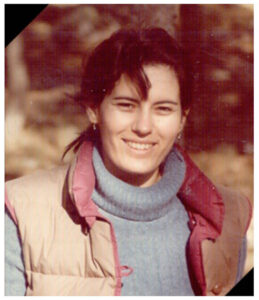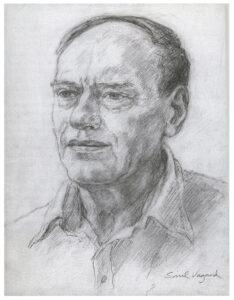The prophetic “Darkness at Noon” is one of the 165 poems composed by Israeli scholar Yohanan Ramati from the 1980s through the early 90s, which are collected in the volume Fata Morgana, published by the Bialik Institute in Jerusalem in 1995. A very brief biography of Mr. Ramati, from the book’s cover, follows:
“Yohanan Ramati, born in Warsaw, Poland, in 1921, went to school in Switzerland and Vienna. In 1935, because his father decided Poland was no place for Jews, Ramati was sent to England. He watched Neville Chamberlain promise the world “Peace in our time” after signing the Munich pact with Hitler. In 1939-1942 he studied Politics, Economics, and Philosophy at Oxford University. He then worked as a coal miner in Yorkshire, before joining the British Army in which he served until 1948.
“Settling in Israel in 1949, he worked at writing reports, studies, and newspaper articles. From 1954 to 1976 he was managing editor of The Israel Economist. His poetry, though written after he turned 60, strongly appeals to young people in their twenties and thirties in its candor, directness, and understanding for universal human feelings and problems, despite his unconcealed Jewish patriotism. He has often said that a person who cannot love his own people is incapable of loving humanity. Of his musical compositions, three have been broadcast and several others have been performed at public concerts.
“Yohanan Ramati married Datia (nee Kaplan) in 1947. One of their children, Eliora Carmon – commemorated in Ramati’s symphonic poem – was killed when the Israeli Embassy in Buenos Aires was blown up by terrorists in 1992. Their two other children, Michal and Yonatan, live in Galilee.”
✡ ✡ ✡
Eliora Carmon, from the X account of the Israel Foreign Ministry
____________________
The poems in Fata Morgana are divided into five sections, entitled – in sequence – “Ballads” (8 poems), “Love” (40), “Children” (6), “Animal Poems” (15), “Americana” (4), “Of Man and the Universe” (the largest section, with 70 poems, including “Darkness at Noon”), “The Jews” (6), and lastly, “Israel, Oh Israel!” (16 poems).
Fata Morgana is entirely absent of explanatory text about the specific date of composition of Mr. Ramati’s poems, or, the “sparks” of emotion, time, and place that inspired their creation; it only includes titles and text, leaving influences to the imagination of the reader.
As for the very phrase “Darkness At Noon”, Mr. Ramati specifically acknowledges Arthur Koestler’s novel as the inspiration for his poem.
What about “Fata Morgana”? As described at Wikipedia, the phrase is Italian, and is the designation for, “…a complex form of superior mirage visible in a narrow band right above the horizon. The term Fata Morgana is the Italian translation of “Morgan the Fairy” ([the enchantress] Morgan le Fay of Arthurian legend). These mirages are often seen in the Italian Strait of Messina, and were described as fairy castles in the air or false land conjured by her magic.” Tellingly, “Fata Morgana mirages significantly distort the object or objects on which they are based, often such that the object is completely unrecognizable.”
In literary terms, a Fata Morgana, “…is usually associated with something mysterious, something that never could be approached.” Examples given at Wikipedia include Henry Wadsworth Longfellow’s 1873 poem by that name, the poet Christoph Martin Wieland’s use of the phrase to denote “…castles in the air,” and, the famed H.P. Lovecraft’s allusion to the phenomenon in describing atmospheric effects in Antarctica, in his famous and culturally influential 1936 short novel of cosmic horror, “At the Mountains of Madness”.
Mr. Ramati’s prophetic non-fiction essays, which I believe appeared in the Bulletin of the Jerusalem Institute for Western Defence, published between 1989 and 2009, include:
“Jewish Motives” (February, 1994)
“Friends”
“The Islamic Danger to Western Civilization”
“Israel’s Real Strategic Problems”,
“Lies, Damned Lies, and Statistics – A Comparative Case Study of The Yugoslav and Middle East Crises” (December, 1996)
✡ ✡ ✡
Portrait of Yohanan Ramati by Sissel Vagard
____________________
Darkness at Noon
(With apologies to Arthur Koestler, who would have understood.)
The little screens are fed by fertile brains
Of the select who know what people need
And pose as guardians of our liberties
Yet treat us with contempt.
We like their face,
The face of self-appointed oracles
Pronouncing doom on values we revered
When we could still distinguish true from false,
When love of country still was burning deep
In many souls… and in our musing minds
We contemplated a nefarious world
Without attempting to deceive ourselves
Each day and every minute.
They are dead –
Those days when some illumined were by faith
While others lived, and living made mistakes
Which were at least their own.
Like vipers’ teeth
Unholy years have left their deadly mark:
Week after weary week we watched the shades
Performing rites of gods we let usurp
The seats of power, our vision warped
By wishful dreams.
They sang to us their songs
Of everlasting peace if we succumb
Or just refrain from succouring our friends,
Describing them as denizens of hell
With skillful touches of satanic pens
Dipped into vicious venom.
Knowing us
With all our weaknesses, they made us laugh,
Feeding the cruelty in human hearts
With ridicule of all that we held dear,
Destroying values e’en as we believed
They were but joking… And they played their parts
With charismatic lustre blinding us
To their true meaning, to the little push
Towards a tempting, effervescent glow
Obscuring the reality beneath.
* * *
“You’re lying!” says the stooge – and I reply:
Can you still tell the tyrant from the serf?
Can you still recognize your liberties?
Or do you now imagine like the rest
That these be but the freedom of the men
Who feed the screens to tell you what to think?
* * *
Democracy was once the people’s rule.
Today, it is the undisputed realm
Of those we’re not allowed to criticize
On pain of ostracism: The handsome lout
Who reads the news with just the slightest touch
Of sarcasm or appeal to guide our will,
The make-up man whose anonymous hate
Turns would-be politicians into ghouls,
The commentator with the gracious smile
Bought by a boorish sheikh whose distant wealth
Controls the pearls of wisdom we lap up,
The journalist who will report the facts
Only if they accord with his beliefs
Or with the views of the conceited ass
Who owns his paper…
Yea, integrity
May yet be found among this curious caste
But rarely, oh, so rarely!
* * *
Dare I think
Just for myself?
Dare I express a doubt
Concerning fashions deprecating pride
And whisper loyalty to my own flag?
Dare I yet offer to defend my state,
Its interest and the free allied with us?
Is our sacred blood
Really so precious that to spill a drop
To protect freedom is a blasphemy,
So oppressors vile
Need kill but five of us – the rest will run?
* * *
Protesters march with banners fiercely held
Beneath a sky abandoned. For our sun,
The sun of human hope has disappeared
Covered by clouds of cant.
We humbly watch
The scene through the impenetrable bars
Of an infernal logic teaching us
That right is wrong and left is always right,
That weak is good and red is really white,
That fear deserves our praise, that freedom means
Your freedom to assist a foreign foe
But never mine to stop you doing so!
I want to scream, but who will hear my pain?
The little screen no longer has a place
For morons who would banish what it calls
“The Spirit of Our Age”.
So deep within
My heart must slowly break as there, outside, The darkness reigns at noon…
And further…
Yohanan Ramati, at…
… University of Saint Andrews (Correspondence)
… The National Library of Israel
… Billion Graves (יוחנן רמתי)


